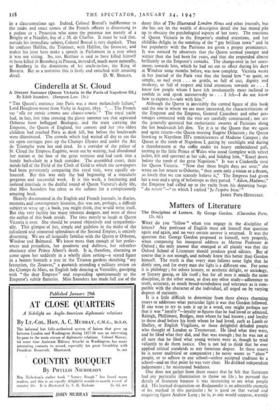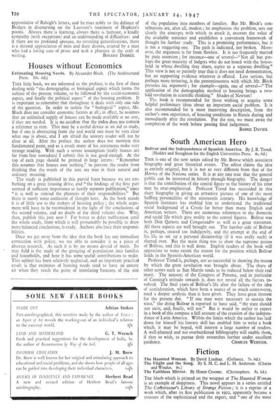Matters of Literature
WHAT do you "follow " when you engage in the discipline of letters? Any professor of English must ask himself that question again and again, and no very certain answer is returned. It was the question that George Gordon proposed to himself, very properly, when composing his inaugural address as Merton Professor at Oxford ; the only answer that emerged at all plainly was that the Oxford School of Literature should produce good editors. But of course- that is not enough, and nobody knew this better than Gordon himself. The truth is that every man follows some light that. he dimly sees, and for every man the light is a different one. For some it is philology ; for others history, or aesthetic delight, or sociology, or literary gossip, or life itself ; but for all men it entails the same discipline, in the other sense, as does any other study—adherence to truth, accuracy, as much broad-mindedness and tolerance as is com- patible with the character of the individual, all urged on by varying degrees of curiosity.
It is a little difficult to determine 'from these always charming essays or addresses what particular light it was that Gordon followed. If one were to try to sum it up in a word, one might perhaps say that it was " loyalty "—loyalty to figures that he had loved or admired, Raleigh, Phillimore, Bridges, men whom he had known ; and loyalty to those dead before his birth whom he had loved, such as Lamb or Shelley,, or English Virgilians, or those delightful deluded people who thought of London as Troynovant. He liked what they were, and he liked what they did, and that was enough ; but he was not at all sure that he liked what young writers were at, though he tried valiantly to do them justice. One is not led to think that he ever applied critical standards to any ferocious degree. In these essays he is never analytical or comparative • he never wants to " place " people, or to adhere to any school—unless accepted tradition be a school—and on that point he was very clear. He disliked independent judgements ; he mistrusted boldness.
One does not gather from these essays that he felt that literature had any particular illumination to throw on life ; he pursued the details of literature because it was interesting to see what people did. His learned disquisition on Redgauntlet is an admirable example of his method in this particular ; he is good on that varied and enquiring figure Andrew Lang ; he is, as one would suppose,..warmly
appreciative of Raleigh's letters, and he rises nobly to the defence of Bridges in discoursing on the Laureate's treatment of Hopkins's poems. Always there is learning, always there is humour, a kindly sympathy (with exceptions) and an understanding of difficulties : and if there are no profound apercus, no revealing generalisations, there is a shrewd appreciation of men and their desires, uttered by a man who had a loving care of prose and took a pleasure in the craft of



































 Previous page
Previous page